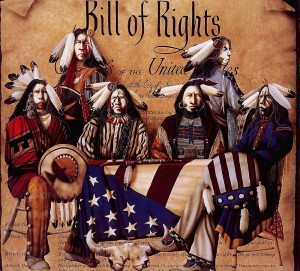There has been lots of recent news and opinions about two “video-on-demand” alternatives for those of us looking beyond cable television or those cute round things you call DVDs. In one corner, Netflix’s ubiquity with its “all you can eat” buffet of 10K movies for about $10 a month. In the other corner, Amazon is offering “Prime” customers (those paying $79 annually for free/discounted shipping) about 5K movies.
Well friends, let’s look at the Amazon/Netflix solutions, then “cut to wide shot” and explore where this marketplace is heading. Finally I propose a “Viewer Bill of Rights” for consuming movies, television programming and video. Sign and adapt accordingly in comments.
Kevin Berk (SeekingAlpha) makes a fairly strong argument that Netflix will triumph, and his strongest point is this:
Amazon is a very complex business with lots of moving parts and many areas of rapid growth. It doesn’t need its online video subscription business to succeed for Amazon as a whole to succeed. The same cannot be said about Netflix. It will fight hard for leadership in this space, since it is an existential issue for it.
Immediately following that quote, however, is Netflix’s achilles heel:
Amazon won’t need to (and therefore won’t want to) sacrifice profitability to do so.
Amazon’s 5K “all-you-can-stream” offering is inferior, which Bob Etier points out on the ad-cluttered Technorati. But it’s bundled with its already fair $79 “Prime” offering.

Now I, an under-qualified futurist, will help you anticipate a few phases of development in the “on demand” revolution/evolution. Here are some non-sequential and fairly accurate highlights of what’s coming:
- Early adopters will dable. In the next 6 months, you can find out whether Amazon or Netflix is better for on-demand flicks (check out this MSNBC report). One survey says we Netflix folks may jump ship for Amazon. Hmm. These two movie-streaming services will co-exist for a while, and many of us will use both. Anything’s better than the awkward, bloated and limited selection from cable providers (for now). As someone who owns just about every damned device (Fios, Roku, AppleTV, web-connected televisions, GoogleTV) and service (Netflix, Amazon, cableTV, TiVo, and more I can’t even recall right now), I can say this with confidence: It’s an unsustainable headache. And despite our progress, we’re still prone to buying the occasional on-demand flick from Verizon Fios when we’re feeling extremely lazy and it’s on sale.
- The market becomes fragmented, confusing, (and eventually healed). For now, web-connected devices appear to be disrupting the market but that will settle. Even my “fast follower” friends and family, never mind those awkward laggards, can’t be bothered. We can’t underestimate a truism about media consumption: the critical mass is lazy and will default to its cable/web/phone provider unless there’s a very good reason to do otherwise. For proof, look how Comcast and Verizon kept the far superior TiVo boxes from the masses.
- Cable/telcom will still dominate, if only because we humans don’t like too many choices. Check NewTeeVee’s review of recent “pay TV” subscriber gains and losses and you’ll see the industry is far from dead. Again- early adopters don’t mind multiple devices and services, but most humans will want one damned subscription/device to view live television, time-shifted television programs, movies and the crap on YouTube. I can’t stress how important that is, and how much that makes us dependent on a bundled cable/telcom solution… despite its horrific progress in the “on demand video marketplace” (which I mean broadly to refer to any time-shifted video consumption).
- Netflix gets nipped. Later this year and in 2012, expect someone to acquire Netflix and screw it up. Amazon was a potential buyer, but appears to be going solo for now. That leaves Apple, Google or a Comcast/Verizon. Amazon’s streaming media, of course, will be an ongoing force because a) Amazon has critical mass in still-flourishing DVD sales, and b) Amazon’s streaming offering is not a potential acquisition candidate for an archaic media middleman.
- Anything but iTunes. Consumers, media providers and device manufacturers will prefer multiple intermediaries to avoid Apple writing “The Rules” ala music and apps. That won’t stop Apple, even without Jobs, from making a Herculean effort to transform the video/film industry like it did with to redefine the music industry and create an app marketplace. This time, however, studios will be “on guard,” having learned from the music industry. The movie industry, unlike apps, runs heavier and more slowly but with greater force. And the video/film marketplace, unlike music, can’t be Mac-dependent this time, since a) most of us use PCs, b) the AppleTV hasn’t quite seen adoption even marginally resembling iPods, iPhones and iPads. There may still be time for an “iTunes for television/film,” but each year it looks less likely, and Apple seems to be after lower hanging fruit.
- Don’t forget Google. Google continues to chug along with Android, GoogleTV and YouTube, and we can expect it to be brewing up something that is consumer friendly and tolerable to media providers.
- Oh, then there’s the predictably unpredictable startup. Lastly, there’s still hope for a startup that comes from nowhere like YouTube, Facebook or friggin’ Groupon. I’ll use again the sailing metaphor. When you’re the first in a sailing race, you maintain your lead by mimicking the exact moves of the closest competitor. Given similar wind conditions (market events) that ensures #2 can catch up. But startups have nothing to protect: no declining DVD sales to maintain, no subscribers to hold, no infrastructure to protect. So they can do ridiculously innovative things that disrupt the video/movie “on demand” marketplace in ways we can’t predict.
- We, the consumers, shall buy and watch our videos and movies regardless of the screen (phone, tablet, computer, television). Daisy Whitney’s New Media Minute has some tips on tablet-to-cloud-to-TV solutions.
- If we can not enjoy our licensed/purchased/rented/free content (movies and video) seamlessly via your device (AppleTV, TiVo, Roku, laptops, iPad, iPhone, GoogleTV, web-enabled TVs, web-enabled BlueRays) we shall have the right to hack it.
- We shall honor the copyrights of your content, but not the awkward mobility limits. So if we purchased something on our circa-2005 Mac we have the maintain the right to enjoy it on our iPhone without proving we own it or disabling our 4 other dead Macs. If we bought a movie on the stupid Fios box, we still own it when the device is in our garage and we switched to Comcast.
- We know your devices may be bundled with a subscription service or vice versa, and if yours does not play nicely with other devices and services we have the right to take our ball and bat, and go home.
- We people have the right to use a buttery TiVo or AppleTV interface without both paying for the device AND the subscription. Pick one, providers: charge for the unit or the device, but not both.
- If we pay for content, we have the right to enjoy it without advertising or bandwidth contraints. If we suffer ads, then the content shall be cheaper or free.
- We have the right to choose ala-cart (rent one movie) or “all you can eat” (watch unlimited selection) from any provider without extreme penalty.
- We have the right to a reasonable device issued by The Cable Company that has a virtual monopoly on us. If The Cable Company abuses that privilege with a crappy box, we have the right to use its bandwidth to circumvent it.
- We demand that our content rights (subscription/purchase) be portable via our smart phones, so we can can beam our purchased/licensed/rented crap to any television or computer monitor… especially the TV in our hotel room ($13 movies and $12 web access? Really?).


This is by far your best post in years. Clear, concise, excellent arguments, and a racist painting of native americans with feathers on their heads. And I must say the handful of clonopin I downed about 20 minutes ago had nothing to do with my opinion. Man, you should see the orangatan in my living room. So orange and hairy. Hope theyre not carnivores. Whoops. There goes my cat.
Both Netflix and Amazon’s streaming on demand services are ridiculously limited compared to their content available via DVD. It’s not worth paying for just yet IMHO.
I ate your cat, sukatra
http://bit.ly/hg08n1
@3 oh my god, I cant believe you were in my apartment.
Of course this would be the closest sukatra’s been to having her pussy eaten in over a decade.
Matt, thats the tackiest comment ive ever seen on this blog, and that takes some balls for me, sukatra, to say that. Im sorry I insulted you about not having a girlfriend, but dont ever go that far again.
@Alexis Netflix and Amazon offer what is Up-to-date and currently in-demand. They are keeping from busting the bank by purchasing a Full Library of Worldwide Movies.
No one has even mentioned BlockBuster as they are closing up shop on brick and mortar. They have failed to get their foot into the door where Netflix has: Gaming/MultiMedia Platforms: Xbox360, PS3 & Wii.
The real question is will DVD and Physical copies of Movies,TV Shows, etc.. go away? What about those people who enjoy collecting DVDs? OWNING those pieces of media, that for the most part, Take up space 364 days of the year.
@Kiddsock I think the problem is more that they are having trouble negotiating terms with the copyright holders who are being dragged into the 21st century kicking and screaming.
Fart, heh. This made me wonder, when exactly was the last time I actually took out a dvd disc and watched it…?